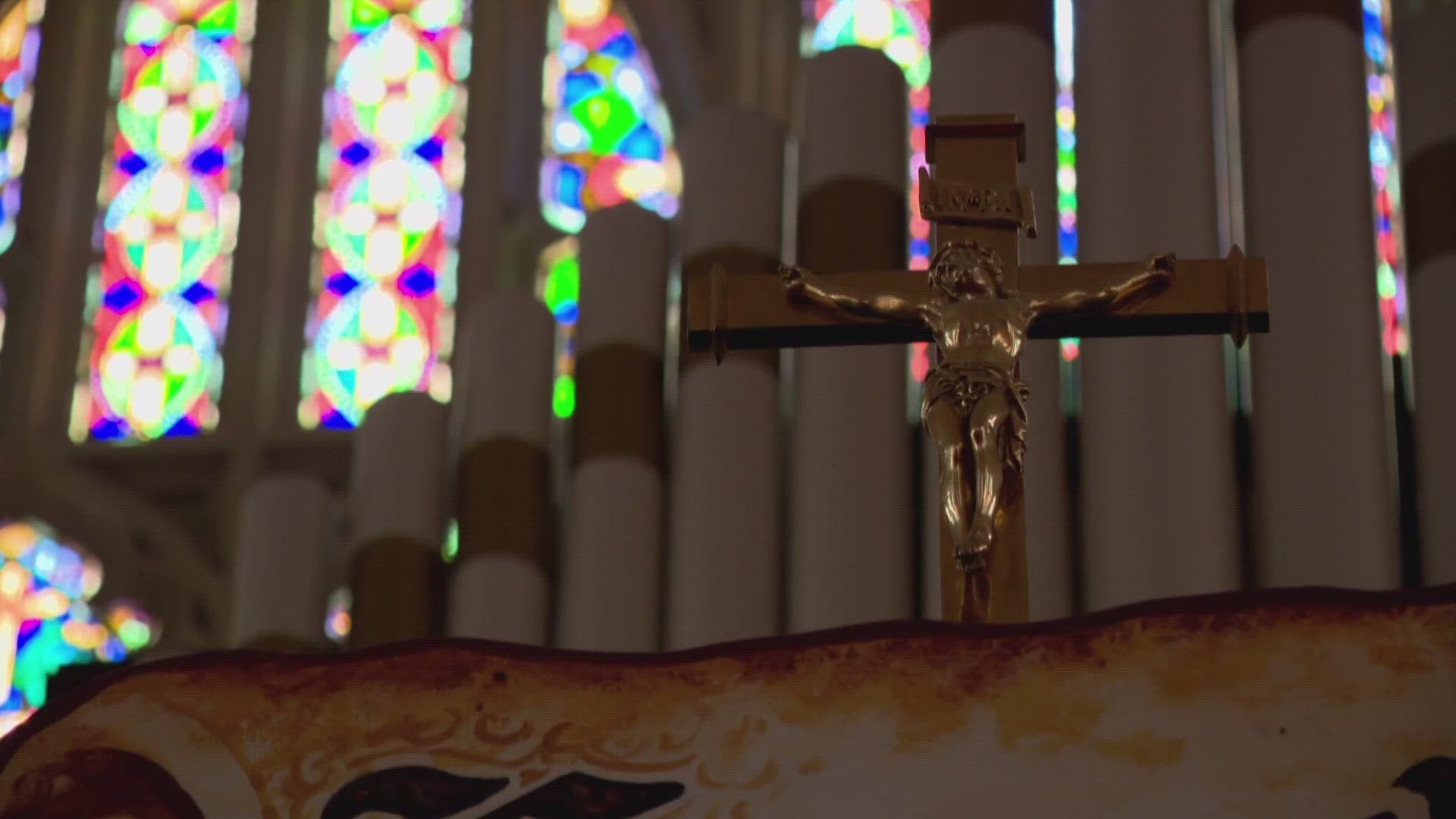ST. LOUIS — The start of a new month means the start of a new beginning within the Archdiocese of St. Louis.
The "All Things New" restructuring plan went into effect on August 1.
It will reshape 178 Catholic parishes into 134.
Just 24 hours into the transition, the Archdiocese announced the "All Things New" plan is on pause for seven parishes that are appealing to the Vatican.
The effects of decrees have been suspended for these seven parishes:
- St. Angela Merici (Florissant)
- St. Catherine of Alexandria Parish (Coffman)
- St. Francis of Assisi Parish (Luebbering)
- St. Martin of Tours Parish (Lemay)
- St. Matthew the Apostle Parish (St. Louis)
- St. Richard Parish (Creve Coeur)
- St. Roch Parish (St. Louis)
This is after Archbishop Michael Rozanski declined to reverse their decrees.
"Out of respect for each parishioner’s right to this recourse and in keeping with Archbishop Rozanski’s desire to maintain access to the sacraments, we will be suspending the effects of the following All Things New decrees until this process has been exhausted," the Archdiocese said in a statement.
Priest reassignments will continue as planned.
According to the Archdiocese, this is what suspending effects means on a practical level for the parishes:
- Financial accounts should not be closed or merged.
- Finance Councils should not be dissolved or merged.
- Current or interim Mass schedules will not be affected.
- Parish Councils can work together.
- Upcoming school decisions will not be affected.
Jason Bolte, found Save Rome of the West, and now he's hoping to find answers for six parishes. He has been able to help several parishes write appeals, including his own at St. Barnabas. Now, he says he worries about what's next.
"When we got the news seven were being suspended, the ones we wrote weren't included in that," Bolte said.
Bolte said he believes six additional parishes are not on the Archdiocese list for a pause.
This includes:
- St. John Paul II (Affton)
- Sts. Philip and James (River aux Vases)
- St. Barnabas (O'Fallon)
- St. Bernadette (Lemay)
- St. Paul (Berger)
- St. Elizabeth Mother of John the Baptist (St. Louis)
The Archdiocese gave specific instructions to parishioners on the proper steps to appeal.
Within a certain time frame, parishioners had to write to the Archbishop and then his office would forward those appeals to the Vatican.
In an appeal letter response statement from the Archdiocese on June 12, it included the process in their statement:
"Canon law allows for 30 days for the Archbishop to review the letters from the time he receives them. He will respond directly to each letter written. Within 15 business days of having received the letter indicating the response of the Archbishop, parishioners who wish to pursue recourse can do so by indicating this in writing to the Archbishop. His office will then forward the acts of the case to the Holy See (the Vatican) for its careful study and decision."
However, Bolte and other parishioners decided to bypass it.
"We went directly to Rome. There's a lack of trust because of lack of transparency and communication and that's why we sent it to Rome. We wanted to make sure all of our points would be made and everything we said to them, we wanted full control to Rome," Bolte said.
Parishioner, Joan Curbow, with St. Martin of Tours Parish, claims they did not go through the Archdiocese and now, Bolte wants a chance.
"They could've put their petition in before we did and they may be ahead of the game a bit. We want the same pause so we can operate as a parish family," he added.
Bolte said they are in limbo and as they wait, they pray for a new path forward.
"We are hoping and praying, we are praying on a daily basis to ask for the holy spirit intercession," Bolte said.
The Archdiocese shared this explanation on what's next for these six additional parishes who went directly to Rome:
In each case where a parishioner has proposed to the Archbishop valid recourse to the Dicastery for the Clergy within the time limit permitted by canon law, Archbishop Rozanski has issued a decree suspending the effects. However, in instances where a parishioner proposed recourse directly to the Dicastery for the Clergy, we do not know if said parishioner sought an interim suspension of the decree. In these cases, we must wait until we receive notification and direction from the Dicastery.

